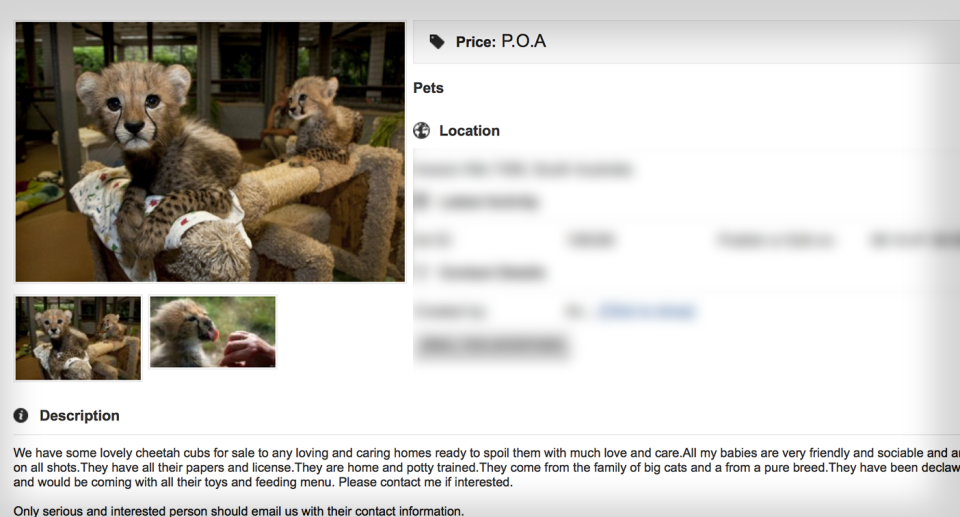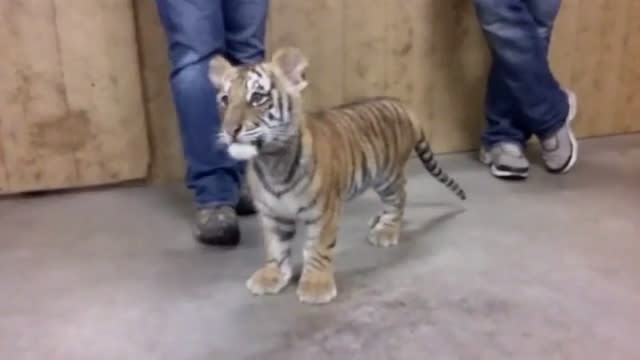Shocking ads selling white lion and tiger cubs to Aussies appear on Facebook
Lion cubs, primates and exotic birds offered for sale on Australian social media pages have raised concerns among wildlife advocates.
White lion cubs are offered at $1700 dollars and white tiger cubs are slightly cheaper at $1550, according one seller who claimed to be based in Istanbul, Turkey.
While Australia has some of the world’s strictest quarantine measures, a seller told Yahoo News Australia that he can deliver exotic pets to Sydney and Melbourne from the Middle East.

“We can deliver to you in Australia without any problem,” the seller said in a text message.
“We know all the importation requirements of Australia for exotic cats…
“You shall have no problem with custom [sic] and your local authorities of Australia as we shall provide all paperwork.”
Lion seller referred to Scamwatch
The seller claimed he could organise vaccinations, a certificate of ownership, and a permit from CITES, the organisation that regulates the trade of endangered species between international governments.
He told Yahoo News Australia that buyers didn’t have to be zoos, and claimed to have imported lions into Sydney in 2012.
In an earlier message to the animal welfare charity, For the Love of Wildlife, the man said he had sent animals to Melbourne in the same year.

The charity’s founder, Donalea Patman said she was alerted to the advertisements by a concerned Facebook user on August 10, which was World Lion Day.
These messages were forwarded to the Department of Agriculture and Environment, who said they could not comment as they had referred the matter to the ACCC.
The ACCC said they had received the information as a Scamwatch report – the division which provides information to consumers about how to “recognise, avoid and report scams”.

“The Department of Agriculture has informed Scamwatch of these ads, however to date we have not received any reports regarding these websites or scams involving similar exotic animals,” an ACCC spokesperson said.
“We are and will continue to monitor Scamwatch reports.”
They said they could not provide further information as to whether there was an ongoing investigation.
American tourists playing with lion cubs
When Yahoo News Australia asked the seller to provide evidence they had wildlife in their possession, they sent two videos.
One shows a group of live white tiger cubs inside a bare room with concrete floors and brick walls, while birds can be heard screeching in the background.
In the other video, American tourists can be seen lying down and interacting with a group young tigers.
Neither video could be verified, and further requests for evidence were not met.
“I gave you videos of what is available,” the seller wrote.
“Hope you are a serious person not out to waste our time.”
The seller has not responded since they were reminded that questions were coming from Yahoo News Australia.
Call to reform global wildlife trade
Ms Patman from For the Love of Wildlife said despite red flags being raised over the legitimacy of the Turkish wildlife seller, there remains an “enormous trade” in exotic species in Australia.
Much of the online trade is in the body parts of exotic species, like elephant ivory and rhinoceros horn.

While the federal government announced in August last year that it intended to ban ivory sales within Australia, one year on the states have yet to ratify the agreement.
While Australia has an electronic wildlife permit system, CITES largely operates on an “outdated” analogue system.
Ms Patman argues that in order for wildlife to be accurately tracked in and out of Australia, CITES needs to modernise.
'Smoke and loud bangs': Endangered bats at risk as relocations go ahead
Slaughtered in the street: Brutal treatment of Australian sheep caught on camera
'World needs more of this': Dogs destined for slaughter in love with rescuers
“We’d be naive to think there isn't an ever increasing trade in exotic pets and in wildlife body parts,” she said.
“(Globally), the legal Trade in Endangered Species is worth more than $320 billion a year.
“Yet the mechanism that facilitates that legal trade hasn't been updated since the 70s and is mostly paper-based.”
Do you have a story tip? Email: newsroomau@yahoonews.com.
You can also follow us on Facebook, Instagram and Twitter and download the Yahoo News app from the App Store or Google Play.




